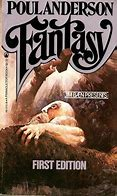In this article, Poul Anderson speculates that the earliest language was not signals between animals but stories symbolizing the mysteries of life. I think that language is more likely to have begun with signals.
When I was a philosophy student, we studied a set of unpublished notes which argued that when we tell someone something, we:
try to cause the other person to believe something;
try to cause him to believe it by causing him to know that we want him to believe it;
think that it is unlikely that he would come to believe it if he did not know that we were trying to cause him to believe it.
I think that a possible origin of language is as follows. Proto-human hunters, cooperating with each other, are stalking their prey from different directions. One individual, noticing that one of his companions is in turn being stalked by a predator, mimics a scream of fear or pain. His intention is neither to enact fear or pain, as in a dramatic performance, nor to pretend that he himself is in fear or pain but to warn his companion who, having heard that mock scream, will look around him, will see that he is in danger and will then understand that the sound had been intended as a warning to him. Thus a re-useable word meaning "Beware!" or "Danger!" has been coined. Practical communication is likely to have preceded symbolic narration.

3 comments:
Kaor, Paul!
I think we see something like that in "The Little Monster," albeit the early humans in that story seem to have mastered self awareness and conscious thought before gaining true speech.
Ad astra! Sean
Most mammals signal to each other. A cat can demonstrably try to get across the idea: "I'm hungry, it's time for dinner, feed me!"
Kaor, Mr. Stirling!
I agree! I've seen dogs doing exactly that: "Gimme some people food!" I can see why, hamburger or pasta tastes better than kibble!
Ad astra! Sean
Post a Comment